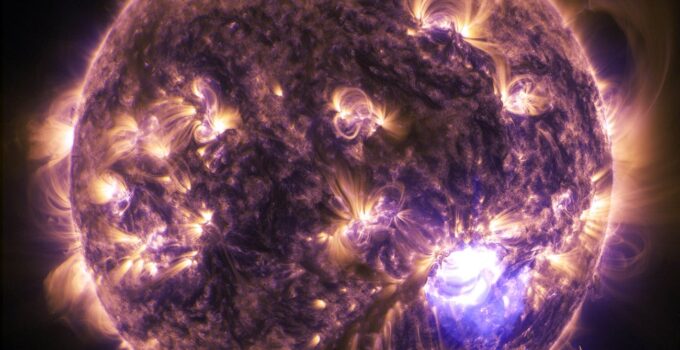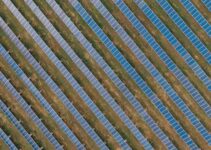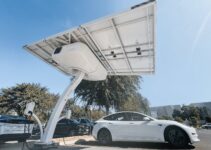Solar energy is becoming increasingly popular as an eco-friendly and cost-effective alternative to traditional energy sources. However, there are still some concerns and misconceptions surrounding solar panels and their potential to emit radiation.
In this article, we will delve into the facts and myths about solar panel radiation to provide a clear understanding of the topic.
Understanding the Basics of Solar Panels
Before we explore the topic of solar panel radiation, it is essential to have a basic understanding of how solar panels work. Solar panels are made up of photovoltaic (PV) cells, which convert sunlight into electricity. These cells are typically made from silicon, a non-toxic and abundant material.
When sunlight hits the solar panel, the PV cells absorb the photons present in the sunlight. This absorption process generates an electric current, which is then used to power electrical devices or stored in batteries for later use. Solar panels do not have any moving parts, and they operate silently, making them a reliable and low-maintenance energy solution.
Debunking the Myth: Solar Panels and Radiation
Contrary to popular belief, solar panels do not emit harmful radiation. The confusion arises from the misconception that solar panels emit ionizing radiation, similar to X-rays or nuclear radiation. In reality, solar panels emit only non-ionizing radiation, which is considered safe for human exposure.
Non-ionizing radiation refers to electromagnetic radiation that does not have sufficient energy to remove electrons from atoms or molecules. Solar panels primarily emit infrared radiation, which is a form of non-ionizing radiation. Infrared radiation is present in sunlight and is responsible for the warmth we feel on our skin when exposed to sunlight.
It is important to distinguish between non-ionizing radiation emitted by solar panels and ionizing radiation, which can be harmful to human health. Ionizing radiation, such as X-rays or nuclear radiation, has high energy levels and can cause damage to cells and DNA.
Exploring the Different Types of Solar Radiation
When discussing solar panel radiation, it is crucial to understand the different types of solar radiation. Solar radiation can be categorized into three main types: ultraviolet (UV) radiation, visible light, and infrared (IR) radiation.
1. Ultraviolet (UV) Radiation:
UV radiation is responsible for sunburns and is often associated with skin damage and an increased risk of skin cancer. However, solar panels do not emit significant amounts of UV radiation. In fact, solar panels can actually help reduce UV radiation exposure by providing shade and protection to the areas they cover.
2. Visible Light:
Visible light is the part of the solar spectrum that our eyes can detect. Solar panels absorb visible light to generate electricity, but they do not emit any significant amount of visible light. Therefore, concerns about the visual impact of solar panels emitting bright light are unfounded.
3. Infrared (IR) Radiation:
Infrared radiation is the primary type of radiation emitted by solar panels. This form of radiation is responsible for the warmth we feel when exposed to sunlight. However, the levels of infrared radiation emitted by solar panels are considered safe and do not pose any health risks.
Is Solar Panel Radiation Harmful to Humans?
Based on current scientific research and expert opinions, solar panel radiation is not harmful to humans. The non-ionizing radiation emitted by solar panels, including infrared radiation, is considered safe for human exposure. Numerous studies have been conducted to assess the potential health risks associated with solar panel radiation, and the consensus is that solar panels pose no significant harm to human health.
It is important to note that solar panel radiation levels are well below the safety limits established by international organizations such as the International Commission on Non-Ionizing Radiation Protection (ICNIRP) and the World Health Organization (WHO). These organizations have set guidelines to ensure that exposure to non-ionizing radiation remains within safe limits.
The Safety Measures in Place for Solar Panels
Solar panels are subject to rigorous testing and certification processes to ensure their safety and compliance with international standards. Manufacturers are required to meet specific safety requirements, including electrical safety, fire resistance, and mechanical stability.
Additionally, solar panels are designed with built-in safety features to prevent any potential risks. These features include bypass diodes to minimize the impact of shading or damage to individual cells, junction boxes with surge protection, and grounding systems to protect against electrical faults.
Furthermore, solar panel installations are typically carried out by trained professionals who follow strict safety protocols. This ensures that the panels are installed correctly and safely, minimizing any potential risks associated with the installation process.
Tips for a Healthy and Safe Solar Panel Installation
If you are considering installing solar panels, here are some tips to ensure a healthy and safe installation:
- Hire a reputable and certified solar panel installer who adheres to industry standards and safety guidelines.
- Ensure that the solar panels and all associated equipment meet the necessary safety certifications.
- Choose a suitable location for the solar panels that maximizes sunlight exposure while considering any potential shading issues.
- Regularly inspect and maintain your solar panel system to ensure optimal performance and safety.
- Follow the manufacturer’s instructions and guidelines for cleaning and maintenance to avoid any potential hazards.
Frequently Asked Questions about Do Solar Panels Emit Radiation?
Here are some frequently asked questions about solar panel radiation:
Q: Can solar panels emit harmful radiation?
A: No, solar panels emit only non-ionizing radiation, which is considered safe for human exposure.
Q: Do solar panels emit ultraviolet (UV) radiation?
A: Solar panels do not emit significant amounts of UV radiation. In fact, they can provide shade and reduce UV radiation exposure in the areas they cover.
Q: Are solar panels safe for human health?
A: Yes, solar panels are considered safe for human health. They emit non-ionizing radiation, which is well below the established safety limits.
Q: Do solar panels emit visible light?
A: Solar panels absorb visible light to generate electricity but do not emit any significant amount of visible light.
Expert Advice
When it comes to solar panel radiation, it is important to rely on expert advice and scientific research. Leading international organizations, such as the ICNIRP and WHO, have extensively studied the topic and have concluded that solar panels pose no significant health risks. Therefore, you can confidently harness solar energy without worrying about radiation exposure.
In conclusion, solar panels do not emit harmful radiation. The non-ionizing radiation they emit, primarily in the form of infrared radiation, is considered safe for human exposure. By understanding the facts and debunking the myths surrounding solar panel radiation, we can embrace solar energy as a clean and sustainable power source.






